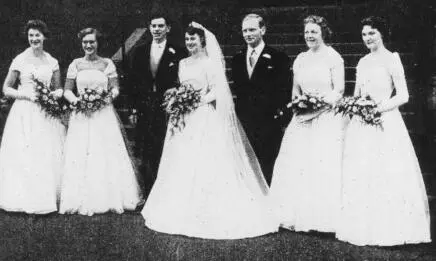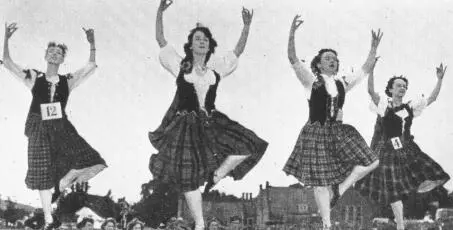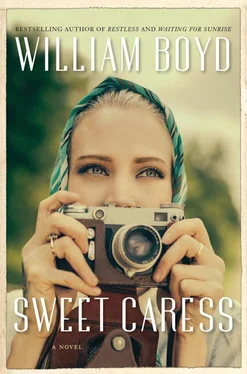Frank went on to say that when he limped up, some half an hour after the battle around the post office had ended, the bodies had been carried out into the street and laid out in rows. ‘About thirty or so of them, all told,’ he said. ‘It was very upsetting, no getting away from it, seeing these dead boys. It wasn’t right, you know, asking these children to fight our lot. They didn’t stand a hope in hell.’
I thought back to that morning, to the bandstand in the ruined park and the eerie silence of the commandos, taking in what they’d just seen and done.
‘There’s a difference between a young soldier and a boy,’ Frank said. ‘Most soldiers are very young — but those Hitler Youth. I mean, I was only twenty, for God’s sake. But I was a man, exceptionally well trained in my job. These boys should have been at school or at home with their mum and dad. And I could see, even then, that Sholto was affected very badly. I think it was because he’d taken it on himself to throw all the grenades in. We all said: how could anyone know? They were shooting at us, killing and wounding us. As far as we were concerned they might have been SS storm troopers. But it shook him up — it shook me up. I think now we shouldn’t have brought the bodies up from the cellar, laid them out in the street like that; we should have just left them in the house and moved on. A lot of the guys were very upset when they saw how young they were. .’
He tailed off and finished his gin and tonic. He was looking a bit grim and upset himself, thinking back in this way.
‘I definitely need another large one of these,’ he said.
I said I did too.
‘Right everybody. Big smile! Say “cheese”!’
The group stiffened up, checked their positions, put on their unnatural smiles and I took the photograph. Some twenty people were lined up, arranged in two rows, the bride and groom centred, in front of the entrance to the old parish church in Peebles, in the Tweed Valley. I took two more photographs for luck and let the wedding party disperse to the reception at the Tontine Hotel about a hundred yards away.
I packed away my camera and tripod and lugged them back to where I’d parked the Imp. I felt the usual depression settle on my shoulders and ignored it. No, Amory, stop it. I wasn’t photographing pets but it was close. Still, I had a job, I was earning money. I had no right to complain or feel aggrieved.
I was working for a monthly illustrated magazine called Scotia!. It was a rival to similar magazines such as Scottish Field, Caledonia, Scotland Today, Bonny Scotland and the like, whose staple journalistic menu dealt with the seasonal traditions of our small country — shooting, fishing (‘Rod, Reel and Line’), stalking, game fairs, agricultural shows (‘Country Notes’), robust outdoor fashion, motor cars and — this is where I came in — the social round. Weddings, balls (‘How to Wear a Sash’), christenings, Highland gatherings, tournaments, military tattoos, funerals and so on, were covered by Scotia! with all the nuance and artistic flair reserved for team photographs of rugby, football, golf and cricket clubs. The subjects formed a line and they were photographed. Couples stood side by side, ditto. These subjects and couples then usually asked for copies of said photographs and thereby provided a significant revenue stream for the magazine. It was not to be taken lightly, so the editor regularly told me.
Scotia! was edited by a client of Joe Dunraven. Joe had secured me the job as a favour once he knew my history as a professional photographer. His client, Hughie Anstruther, was more than happy to take me on, given my experience (and my title), but he very quickly advised me: don’t get any fancy ideas, Lady Farr, this is not American Mode. I didn’t.
Hughie Anstruther was a neat, waspish, vain man who combed his side hair over his bald pate in an elaborate coil, like a table mat or hemp rope, and was oblivious to the tonsorial effect of this on his otherwise respectable appearance. But I came to like him and the job he gave me allowed me to supplement my allowance from the Farr settlement. I wasn’t poor but I had to budget carefully. I had a house to live in but it was certainly no palace. It struck me that, entirely inadvertently, I had come full circle. I had started off an impoverished young woman, taking society photographs with Greville in the 1920s to make ends meet, and here I was, decades on, an impecunious middle-aged woman, doing exactly the same.


The world of Scotia! © Scotia Media Enterprises Ltd, 1964.
I was beginning to feel, also, after the turmoil of my recent years with Sholto, that I’d entered a form of quietus. The cottage was entirely comfortable, though a little basic; the girls were on the point of leaving school; I was relatively solvent, relatively comfortably housed, secure enough, employed, after a fashion. I couldn’t complain. But was I happy?
I had integrated myself, as far as any newcomer could, into the small but diverse island community of Barrandale. I had found a few new friends and, another bonus, because they were new I could tell them as much or as little about my past as I wanted. I never advertised myself as the widow of Sholto, Lord Farr. I was just Mrs Farr, or Amory, to the people I dealt with or counted as my new acquaintances.
I hadn’t sought the Scotia! job. Joe Dunraven who, as a matter of course, knew far too much about me, had suggested me to Hughie, and Hughie, thinking my background would open more doors, had eagerly hired me. The job was undemanding: once I’d returned home from whatever wedding or grand ceilidh or memorial service I would develop the film, print contact sheets, annotate them with the names to fill the captions and post them off with the rolls of film to the office in Glasgow. And the next month there would be the evidence of my work on the ‘social pages’. I was consoled only by the thought that I had insisted on remaining uncredited and that I was — in a manner of speaking — still a professional photographer.
I remember when she was fourteen Blythe said that she wanted a guitar for her birthday and so I bought her one. She was quite musical, it turned out — Dido was delighted — and also took piano lessons at school. One night in the cottage when she and Annie were home on holiday I asked her to play something. She sang a song she had written, a plangent minor-key version of the folk song ‘Bobbie Shafto’. She sang it in a husky but true voice as Annie and I sat opposite her, Annie sitting on the floor by my feet, Blythe perched on a stool in front of the fire, her big guitar balanced across her knee.
Bonny Sholto’s gone away,
He’ll not be back another day.
Wherever he’s gone, he’s there to stay,
Bonny Daddy, Sholto.
The song continued — ‘Bonny Sholto went to war’ — but the three of us were sobbing halfway through the second verse and had to stop and hug each other. It was a moment of real catharsis for us all and I had a full sense of the girls’ loss, also. It wasn’t just my grief; the difficult, complicated life of Sholto Farr wasn’t just my problem; the damage wasn’t just limited to me.
I remember that we all went on holiday to Italy to see Greville in his new life. Having sent him out there on assignment in 1944 for GPW , I’m not sure we ever received one photograph in return. But somehow, in his leisurely travels as he — at careful distance — followed the 110th Infantry Division as it advanced north up through Italy, he had contrived to engage a young artist as his translator, called Gianluca Furlan. Gianluca had inherited a small but rather lovely house up in the hills behind Viareggio, in northern Tuscany. After the war Greville moved in. He took photographs; Gianluca painted the Tuscan landscape. They seemed entirely happy and Greville swore he owed it all to me.
Читать дальше














